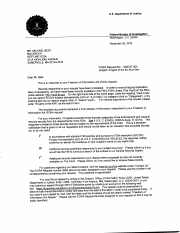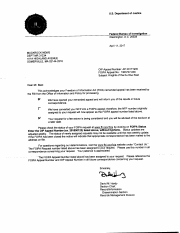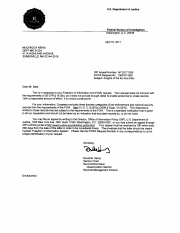Knights of the Ku Klux Klan
It is a clone of this request.
| Tracking # |
1363707-000 |
| Submitted | Dec. 23, 2016 |
| Due | Jan. 25, 2017 |
| Est. Completion | None |
MuckRock users can file, duplicate, track, and share public records requests like this one. Learn more.
Communications
From: Michael Best
To Whom It May Concern:
This is a request under the Freedom of Information Act. I hereby request the following records:
Records relating to or mentioning the Knights of the Ku Klux Klan (KKKK). Founded by David Duke in 1975, the Knights of the Ku Klux Klan has attempted to put a "kinder, gentler" face on the Klan, courting media attention and attempting to portray itself as a modern "white civil rights" organization. The group's leaders, from Duke to current chief Thomas Robb, have been plagued by their own racist views, which inevitably shine through the smokescreen, and by the attacks of other Klan members who view their interest in mainstream media and politics as hypocritical and counterproductive.
The foundation of the Knights of the Ku Klux Klan (KKKK) is shrouded in political myth. Duke's claim that the Knights were founded in 1956 by Ed White (a pseudonym for Jim Lindsay) has, however, been largely discredited as a propagandistic attempt by the budding Klan leader to fend off depictions of his group as an inconsequential upstart. The group seems to have first appeared briefly in New Orleans in 1973, with Duke billing himself grand dragon and Jim Lindsay grand wizard. But records show that the KKKK was not formally incorporated in Louisiana until 1975, following Lindsay's murder, when Duke listed himself as founder and national director and his then-wife, Chloe, as secretary.
Duke's attempts to win over the old guard of Klan leaders, both by re-imagining the origins of his group and by reaching out early on to fellow "Klan brothers," belied his revolutionary plans. Famously calling on fellow Klansmen to "get out of the cow pasture and into hotel meeting rooms," Duke saw himself as the leader of a slick, new Klan which would captivate the public through political discourse, eschewing the violent methods of the past. Duke thus brought the art of media manipulation to the Klan, wooing mainstream media personalities such as NBC host Tom Snyder and attracting dozens of reporters to write excited stories about the Knights' 1977 "Border Patrol" publicity stunt, a supposed effort to close the U.S.-Mexico border to undocumented entrants that lasted just a few days. Under Duke's management, the Knights opened its doors to women and Catholics (while never giving up entirely on the view that women are, above all else, best utilized for producing white babies). This all served to reinforce the public image of a more modern, educated Klan, an image that Duke reinforced by shunning Klan robes for suits and ties.
Duke also revamped the Klan's particular brand of bigotry. No longer a mere horde of cross-burning minority-haters, the Knights, like many other American hate groups, became "Nazified" — focused on Jews rather than blacks as the primary enemy — with Duke spinning elaborate theories about everything from Jewish control of the Federal Reserve to a Jewish conspiracy behind the civil rights movement. Likewise, the leadership of state KKKK chapters boasted a pantheon of budding neo-Nazi figures, including notorious anti-Semite Don Black in Alabama, White Aryan Resistance founder Tom Metzger in California, and David Lane, a future leader of the terrorist group The Order, in Colorado.
For a while, the Knights prospered, hosting in 1975 one of the largest Klan gatherings in decades in Walker, La. By 1979, Duke had built membership in the KKKK to an estimated 1,500, with another 10,000 non-member supporters. Duke and his tactics were arguably the catalyst for the Knights' growth, but the egocentric leader also posed a constant threat to his group. Even one of the Knights' greatest successes, the Walker rally in 1975, contained the seeds of trouble. In the rally's wake, its organizer, Knights member Bill Wilkinson, quit in disgust over Duke's management of the proceeds. This kind of criticism soon became common, with aides to Duke, also including Metzger and others, eventually alienated by what they portrayed as his corruption, his womanizing and his self-serving desire for personal political glory. A series of schisms rocked the Knights, and by 1980, the breakaway group that Wilkinson had formed following his departure — the Invisible Empire, Knights of the Ku Klux Klan — boasted more members than Duke's KKKK.
Thus, by the time that David Duke left in disgrace, after being caught on camera trying to sell the Knights' membership list, the KKKK was already weakened. That, plus the prosecution of several group leaders including Duke for allegedly inciting a riot at a New Orleans meeting, decimated the Knights. Many of those KKKK members who remained followed Duke to his new, non-Klan group, the National Association for the Advancement of White People, and the KKKK almost entirely collapsed several years later with Don Black's 1981 arrest for conspiring to invade the Caribbean nation of Dominica. Leadership of the weakened KKKK passed to Stanley McCollum and the 1980s saw a decline in Klan activity, with the Knights claiming only a few hundred members when Thom Robb took over in 1989.
Robb, who eschewed the Klannish "Imperial Wizard" title in favor of the more businesslike "National Director," led the group to something of a revival in the early 1990s, even attempting at one point to start a family-oriented Klan camp near the KKKK's new headquarters at his home in Harrison, Ark. Claiming, like Duke, to represent a "kinder, gentler" Klan, Robb followed in Duke's media-exploiting footsteps with the added boon of expanded Internet communications. Robb's was the first Klan site on the Web and he managed to develop a number of linked sites, thus creating the impression of a mushrooming cyber-movement. A gifted public speaker, Robb was also an adherent and pastor of Christian Identity theology who wooed his listeners with speeches embracing a more subtle form of hate cloaked behind white "pride" and Christian compassion. But these promising efforts could not stop a series of schisms similar to those that plagued the KKKK under Duke.
Like Duke, Robb also had a sharp interest in financial matters. He "formalized" KKKK recruitment, abandoning initiation rites in favor of a simple mail-in fee, in return for which members received booklets and tests allowing them to pay for their "promotion" to the next level. Complaints arose that this practice made Klan membership virtually meaningless. The salesmanship exhibited by Robb has sparked other controversies about money management, as well. In 1994, a number of high-ranking members split with Robb amidst accusations that he had made off with telephone hotline funds and a $20,000 donation to the group. These peoples were also highly critical of Robb's "kinder, gentler" approach and went on to found more confrontational Klan factions. One of the splinters that emerged was a Michigan-based group that promptly hosted a more "traditional" Klan rally, hoods and all, in Lafayette, Ind. Ed Novak, an ex-lieutenant of Robb's, founded the Chicago-based Federation of Klans and took with him roughly one third of Robb's membership.
Although weakened since the 1994 split, the KKKK has continued to stage rallies and other events, garnering the most media attention for its involvement in several "free speech" lawsuits. The group was represented by the ACLU in a 1999 Missouri case in which a local KKKK chapter was initially barred from participating in the state's "Adopt-a-Highway" cleanup program (the Adopt-a-Highway technique had been advocated by David Duke himself). And, that same year, it engaged in a failed attempt to underwrite St. Louis, Mo., broadcasts of the National Public Radio new program "All Things Considered." Most recently, the Knights were sued by the conservative tabloid Rhinoceros Times in North Carolina for allegedly inserting Klan leaflets into papers that were then distributed to local residences.
Today, Robb's website continues to bill the Knights, somewhat disingenuously, as "the most active white rights organization in America" (it clearly is not) and still offers Klan membership (and promotion!) for a price. Robb recently began calling his organization "The Knights Party" in an attempt to emphasize what he sees as the need for a softer, more political approach along the lines of David Duke's tactics. In order, apparently, to finance political activity, the Knights website offers numerous wares for sale, such as handcrafted, glazed-ceramic statues of Klansmen.
Please conduct a search of the Central Records System, including but not limited to the Electronic Surveillance (ELSUR) Indices, the Microphone Surveillance (MISUR) Indices, the Physical Surveillance (FISUR) Indices, and the Technical Surveillance (TESUR) Indices, for both main-file records and cross-reference records of both HQ and all field offices for all relevant names, agencies, organizations, companies and events including but not limited to those cited in the previous paragraphs and/or links as well as a cross-reference with the Southern Poverty Law Center to include any information provided by the SPLC. My request includes but is not limited to 137, 157, 176, 177, 183, 184, 188, 214 and 266 files. If previously released records are available, then I request a rolling release consisting of those records while additional records are located and processed for release.
I am a member of the news media and request classification as such. I have previously written about the government and its activities for AND Magazine, MuckRock and Glomar Disclosure and have an open arrangement with each. My articles have been widely read, with some reaching over 100,000 readers. As such, as I have a reasonable expectation of publication and my editorial and writing skills are well established. In addition, I discuss and comment on the files online and make them available through the non-profit Internet Archive, disseminating them to a large audience. While my research is not limited to this, a great deal of it, including this, focuses on the activities and attitudes of the government itself. As such, it is not necessary for me to demonstrate the relevance of this particular subject in advance. Additionally, case law states that “proof of the ability to disseminate the released information to a broad cross-section of the public is not required.” Judicial Watch, Inc. v. Dep’t of Justice, 365 F.3d 1108, 1126 (D.C. Cir. 2004); see Carney v. U.S. Dep’t of Justice, 19 F.3d 807, 814-15 (2d Cir. 1994). Further, courts have held that "qualified because it also had “firm” plans to “publish a number of . . . ‘document sets’” concerning United States foreign and national security policy." Under this criteria, as well, I qualify as a member of the news media. Additionally, courts have held that the news media status "focuses on the nature of the requester, not its request. The provision requires that the request be “made by” a representative of the news media. Id. § 552(a)(4)(A)(ii)(II). A newspaper reporter, for example, is a representative of the news media regardless of how much interest there is in the story for which he or she is requesting information." As such, the details of the request itself are moot for the purposes of determining the appropriate fee category. As such, my primary purpose is to inform about government activities by reporting on it and making the raw data available and I therefore request that fees be waived.
The requested documents will be made available to the general public, and this request is not being made for commercial purposes.
In the event that there are fees, I would be grateful if you would inform me of the total charges in advance of fulfilling my request. I would prefer the request filled electronically, by e-mail attachment if available or CD-ROM if not.
Thank you in advance for your anticipated cooperation in this matter. I look forward to receiving your response to this request within 20 business days, as the statute requires.
Sincerely,
Michael Best
From: FOIPARequest
Good morning,
The FBI has received your Freedom of Information Act/Privacy (FOIPA) request and it will be forwarded to Initial Processing for review. Your request will be processed under the provisions of FOIPA and a response will be mailed to you at a later date.
Requests for fee waivers and expedited processing will be addressed once your request has been assigned an FOIPA request number. You will receive written notification of the FBI’s decision.
Information regarding the Freedom of Information Act/Privacy is available at http://www.fbi.gov/ or http://www.fbi.gov/foia/. If you require additional assistance please contact the Public Information Officer.
Thank you,
Holly Early
Government Information Specialist
Record/Information Dissemination Section (RIDS)
FBI-Records Management Division
170 Marcel Drive, Winchester, VA 22602-4843
PIO: (540) 868-4593
Direct: (540) 868-4854
Fax: (540) 868-4391/4997
E-mail: foiparequest@ic.fbi.gov<mailto:foiparequest@ic.fbi.gov>
Questions E-mail: foipaquestions@ic.fbi.gov<mailto:foipaquestions@ic.fbi.gov>
Do you have further questions about the FOI/PA process? Visit us at http://www.fbi.gov/foia
Please check the status of your request online at https://vault.fbi.gov/fdps-1/@@search-fdps. Status updates are performed on a weekly basis.
-

~WRD369
From: Federal Bureau of Investigation
A copy of documents responsive to the request.
From: Michael Best
I am appealing the integrity of the search as no search was performed. I specifically requested "a search of the Central Records System, including but not limited to the Electronic Surveillance (ELSUR) Indices, the Microphone Surveillance (MISUR) Indices, the Physical Surveillance (FISUR) Indices, and the Technical Surveillance (TESUR) Indices, for both main-file records and cross-reference records of both HQ and all field offices for all relevant names, agencies, organizations, companies and events including but not limited to those cited in the previous paragraphs and/or links as well as a cross-reference with the Southern Poverty Law Center to include any information provided by the SPLC. My request includes but is not limited to 137, 157, 176, 177, 183, 184, 188, 214 and 266 files. If previously released records are available, then I request a rolling release consisting of those records while additional records are located and processed for release." None of this was performed.
From: OIP-NoReply@usdoj.gov
01/27/2017 05:10 PM FOIA Request: DOJ-AP-2017-001935
From: Federal Bureau of Investigation
A letter stating that the request appeal has been received and is being processed.
From: Federal Bureau of Investigation
The request has been rejected by the agency.
From: Michael Best
I am appealing the decision that I didn't provide sufficient detail. I provided numerous names, dates, locations, events and beyond that the name of the organization itself is searchable in the CRS, yet the Bureau made no effort to do that.
From: Muckrock Staff
To Whom It May Concern:
I wanted to follow up on the following request, copied below. Please let me know when I can expect to receive a response.
Thanks for your help, and let me know if further clarification is needed.
From: Muckrock Staff
To Whom It May Concern:
I wanted to follow up on the following request, copied below. Please let me know when I can expect to receive a response.
Thanks for your help, and let me know if further clarification is needed.
From: Muckrock Staff
To Whom It May Concern:
I wanted to follow up on the following Freedom of Information Act request, copied below, and originally submitted on Dec. 23, 2016. Please let me know when I can expect to receive a response, or if further clarification is needed. You had assigned it reference number #1363707-000.
Thanks for your help, and let me know if further clarification is needed.
From: Muckrock Staff
To Whom It May Concern:
I wanted to follow up on the following Freedom of Information Act request, copied below, and originally submitted on Dec. 23, 2016. Please let me know when I can expect to receive a response, or if further clarification is needed. You had assigned it reference number #1363707-000.
Thanks for your help, and let me know if further clarification is needed.
From: Muckrock Staff
To Whom It May Concern:
I wanted to follow up on the following Freedom of Information Act request, copied below, and originally submitted on Dec. 23, 2016. Please let me know when I can expect to receive a response, or if further clarification is needed. You had assigned it reference number #1363707-000.
Thanks for your help, and let me know if further clarification is needed.
From: Muckrock Staff
To Whom It May Concern:
I wanted to follow up on the following Freedom of Information Act request, copied below, and originally submitted on Dec. 23, 2016. Please let me know when I can expect to receive a response. You had assigned it reference number #1363707-000.
Thanks for your help, and let me know if further clarification is needed.
From: Muckrock Staff
To Whom It May Concern:
I wanted to follow up on the following Freedom of Information Act request, copied below, and originally submitted on Dec. 23, 2016. Please let me know when I can expect to receive a response. You had assigned it reference number #1363707-000.
Thanks for your help, and let me know if further clarification is needed.
From: Muckrock Staff
To Whom It May Concern:
I wanted to follow up on the following Freedom of Information Act request, copied below, and originally submitted on Dec. 23, 2016. Please let me know when I can expect to receive a response. You had assigned it reference number #1363707-000.
Thanks for your help, and let me know if further clarification is needed.
From: Muckrock Staff
To Whom It May Concern:
I wanted to follow up on the following Freedom of Information Act request, copied below, and originally submitted on Dec. 23, 2016. Please let me know when I can expect to receive a response. You had assigned it reference number #1363707-000.
Thanks for your help, and let me know if further clarification is needed.
From: Muckrock Staff
To Whom It May Concern:
I wanted to follow up on the following Freedom of Information Act request, copied below, and originally submitted on Dec. 23, 2016. Please let me know when I can expect to receive a response. You had assigned it reference number #1363707-000.
Thanks for your help, and let me know if further clarification is needed.
From: Muckrock Staff
To Whom It May Concern:
I wanted to follow up on the following Freedom of Information Act request, copied below, and originally submitted on Dec. 23, 2016. Please let me know when I can expect to receive a response. You had assigned it reference number #1363707-000.
Thanks for your help, and let me know if further clarification is needed.
Files
pages



